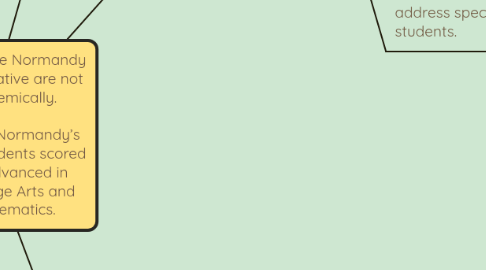
1. Students do not meet academic goals each year.
1.1. Students do not receive rigorous instruction.
1.1.1. Teachers do not have high expectations for students.
1.1.1.1. Teachers buy into societal and community perceptions of students.
1.1.2. Teachers lack necessary skills to improve instruction.
1.1.2.1. Teachers do not have sufficient initial training or ongoing PD
1.1.2.1.1. PD is expensive
1.1.2.1.2. Schools do not prioritize PD.
1.2. Teachers are not prepared to address specific needs of students.
1.2.1. Teachers lack necessary skills to tailor instruction to individual needs.
1.2.1.1. Teachers do not have time to focus on differentiating lessons or improving their practice.
1.2.2. Teachers are not motivated to address individual needs of students.
1.2.2.1. Teachers are stressed and busy.
1.2.2.1.1. Teachers have too many other responsibilities on their plate.
2. Students do not have ownership of their own learning and outcomes.
2.1. Teachers and leaders do not think students can be in charge of their own learning and success.
2.1.1. Teachers and leaders do not think students can handle the responsibility.
2.1.1.1. Students do not have the skills to manage their own learning.
2.1.1.1.1. Schools and parents do not teach students to take ownership or responsibility.
2.1.1.1.2. Students develop at different rates.
2.1.2. Society thinks adults have to plan everything for students.
2.1.2.1. We think it is the role of the adults to make decisions for students under age 18.
2.1.2.1.1. Our society believes in an arbitrary age when students can start making decisions for themselves.
2.1.3. Teachers and leaders do not trust students to make good decisions.
2.1.3.1. Teachers and leaders do not think students will make the best choices for their time.
2.1.3.1.1. Students goof off when they have choice time.
2.1.3.2. Teachers and leaders do not think students will set the right goals.
2.1.3.2.1. We don't understand how much students learn from their environment.
2.1.3.3. Teachers want to prioritize what is important for students.
2.1.3.3.1. Teachers believe that they know the essential goals and outcomes for all students.
2.2. Teachers and leaders do not value student leadership.
2.2.1. The system is not organized to give students ownership.
2.2.1.1. We are afraid to let students lead more aspects of the school.
2.2.1.1.1. Teachers are afraid of losing control.
2.2.1.2. Society believes that adults know more than kids and should make decisions.
2.2.1.2.1. We do not value young people.
2.2.2. Teachers and leaders focus on compliance.
2.2.2.1. They are worried about behavior management.
2.2.2.1.1. They want their schools to seem orderly and calm.
2.3. Teachers and leaders are worried about state test scores.
2.3.1. Schools want their scores to increase.
2.3.1.1. Principals are held accountable for outcomes.
2.3.1.2. Schools are judged by the test scores.
2.3.1.2.1. It is a quick way judge effectiveness and compare schools across the state.
3. Students do not feel invested in school.
3.1. Students do not see the value of education.
3.1.1. Students have their own view of education and success.
3.1.1.1. Students and families value different things than teachers and schools.
3.1.1.1.1. Students and families have other challenges that impact their lives.
3.1.1.1.2. Schools do not understand the community.
3.1.2. Teacher think students do not care, leading them not to care - self-fulfilling prophecy.
3.1.2.1. Students do not act the way teachers expect them to act if they "cared" about education.
3.2. Goals/grades are not meaningful to students.
3.2.1. Students do not understand the connection between grades + future life outcomes.
3.2.1.1. Schools have not connected it to their lives.
3.2.1.1.1. Teachers do not understand their lives and how to engage them.
3.3. School is boring/not aligned to 21st century standards and practices.
3.3.1. Teachers are too focused on tests and rote learning.
3.3.1.1. Teachers do not have the necessary skills and mindsets to teach differently.
